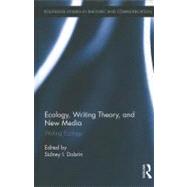
| Introduction: Ecology and a Future of Writing Studies | p. 1 |
| In Terms of Writing As Such | p. 24 |
| Rhetorics of (Non)Symbolic Cultivation | p. 34 |
| Writing Ecologies, Rhetorical Epidemics | p. 51 |
| Agential Matters: Tumbleweed, Women-Pens, Citizens-Hope, and Rhetorical Actancy | p. 67 |
| Discipline and Publish: Reading and Writing the Scholarly Network | p. 92 |
| Digital Ecologies | p. 106 |
| Post-Media Occupations for Writing Theory: From Augmentation to Autopoiesis | p. 122 |
| Quale Morphics: Strategic Wisdom | p. 143 |
| Curating Ecologies, Circulating Musics: From the Public Sphere to Sphere Publics | p. 160 |
| The Ecology of the Question: Reading Austin's Public Housing Debates, 1937-1938 | p. 180 |
| Ecology, Ecologies, and Institutions: Eco and Composition | p. 195 |
| Contributors | p. 213 |
| Index | p. 217 |
| Table of Contents provided by Ingram. All Rights Reserved. |
The New copy of this book will include any supplemental materials advertised. Please check the title of the book to determine if it should include any access cards, study guides, lab manuals, CDs, etc.
The Used, Rental and eBook copies of this book are not guaranteed to include any supplemental materials. Typically, only the book itself is included. This is true even if the title states it includes any access cards, study guides, lab manuals, CDs, etc.